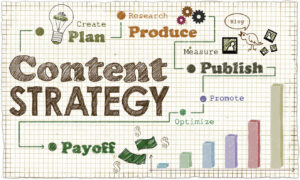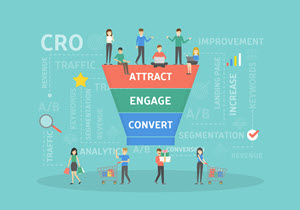Digital Marketing for Manufacturers:
A Comprehensive Guide for Manufacturing Leaders
Digital Marketing for Manufacturers
Digital marketing in manufacturing encompasses a range of online strategies and tools aimed at promoting manufacturing services and products to the right audience at the right time. Digital marketing, inbound marketing, and SEO tactics differ from traditional marketing in the ability to target and engage audiences, including your ideal buyer personas, more precisely, and track results in real time.
Digital Marketing for Manufacturers: Why It Matters Now More Than Ever

Manufacturers can no longer rely solely on trade shows, cold calls, and word-of-mouth to grow their business. Manufacturing has always been relationship-driven, built on long sales cycles, trust, and in-person networking, but things are changing. Buyers are now doing their research online—often long before they reach out to a supplier.
That’s where digital marketing comes in. It allows manufacturers to:
- Expand their reach beyond traditional channels
- Build trust through educational content
- Highlight their technology, innovation, and capabilities in a way that speaks directly to modern buyers
Digital marketing gives manufacturers who are traditionally reliant on conventional marketing tactics new ways to reach prospects, tell their story, and stay relevant and competitive.
The Importance of Digital Marketing for Modern Manufacturers

Digital marketing allows manufacturers to reach wider audiences, showcase their technological advancements, and build stronger customer relationships through targeted, informative content.
Digital marketing for manufacturers includes a range of online strategies designed to promote products, services, and capabilities to targeted audiences. Unlike traditional methods, digital marketing allows manufacturers to:
- Reach the right people at the right time
- Showcase their expertise through content
- Track engagement and ROI in real time
These tools aren’t just about visibility—they’re about creating meaningful connections with buyers who are already searching for solutions. Inbound marketing works, and the marketing professionals at WSI offer decades of experience in all digital marketing services with several Case Studies and a proven track record of results.
Navigating the Digital Landscape in Manufacturing
The digital world is constantly changing, and for manufacturers, it’s important to stay ahead of the curve. Understanding how different digital tools work together is key to building a strong, visible presence online and connecting with the right customers.
Your Digital Ecosystem at a Glance
Today’s digital marketing ecosystem for manufacturers includes everything from your website and search engine visibility to social media, email campaigns, and online advertising. Each of these channels plays a different role, but together, they help tell your story, showcase your capabilities, and drive engagement with potential buyers.

How Digital Trends Are Shaping the Industry
Technologies like AI, machine learning, and the Internet of Things (IoT) are doing more than transforming how products are made—they’re also changing how manufacturers market and sell. From predictive analytics that identify your best prospects to personalized digital ads that speak directly to your audience, these trends offer powerful ways to stay competitive and future-ready.
Digital Marketing Strategies for Manufacturers
WSI marketing professionals offer personalized marketing strategies for our manufacturing clients based on their unique business model, current online presence, goals, and budgetary needs. We provide decades of experience, quick response to customer needs, and transparent results with detailed reporting and regular meetings. We utilize an arsenal of digital marketing tools and professionals to deliver broad digital marketing strategies custom-designed for your business.
Website Optimization
A manufacturer's website is often the first point of contact for potential clients. It's crucial that the website makes a strong, professional impression.
- Essentials of a Manufacturer’s Website: An effective website should be user-friendly, easy to navigate, and visually appealing. It should clearly articulate what the manufacturer offers and its unique value proposition and include calls-to-action (CTAs) to guide the visitor through the buying journey.
- SEO Strategies Designed for the Manufacturing Industry: SEO is vital for manufacturers. It involves optimizing the website with relevant keywords, ensuring mobile-friendliness, and enhancing page load speeds. Content should be tailored to answer specific queries related to the manufacturing sector.
Search Engine Optimization (SEO)

SEO helps manufacturers increase their online visibility and attract more organic traffic.
- Fundamentals of SEO in Manufacturing: This includes keyword research to identify terms your audience is searching for, optimizing website content and structure, and building quality backlinks.
- Advanced SEO Techniques for Enhanced Visibility: Advanced techniques might involve structured data to help search engines understand your content better and optimizing for voice search, considering the rise in voice-activated queries.
Leveraging Social Media
Social media isn't just for consumer brands. Manufacturers can leverage these platforms for branding, customer engagement, and lead generation.
- Identifying the Right Platforms for Manufacturers: Platforms like LinkedIn are ideal for B2B manufacturers, while Instagram and Facebook can showcase the more visual aspects of manufacturing processes.
- Best Practices for Social Media Engagement: Share industry insights, company news, and behind-the-scenes looks into your manufacturing processes. Engage with your audience through comments and messages to build a community around your brand.
Content Marketing

Content marketing helps establish manufacturers as thought leaders in their industry.
- Crafting Effective Content Strategy: This involves creating and distributing valuable, relevant, and consistent content to attract and retain a clearly defined audience.
- Types of Content that Resonate with a Manufacturing Audience: Case studies, whitepapers, and blog posts that address industry challenges and solutions can be particularly effective. Videos showcasing manufacturing processes or product demonstrations can also be powerful.
Email Marketing Strategies
Email marketing remains one of the most effective digital marketing strategies for manufacturers.
- Building and Nurturing an Email List: Create valuable content offers like ebooks or webinars to encourage sign-ups. Segment your email list to deliver more personalized content.
- Designing Effective Email Campaigns: Emails should provide value to your subscribers. This could be in the form of industry news, new product announcements, or exclusive insights.
Paid Advertising

Paid advertising can be a quick way to increase visibility and generate leads.
- Overview of Paid Digital Channels: Options include pay-per-click (PPC) advertising, social media ads, and display ads. Each has its strengths and is suited for different objectives and audiences.
- Crafting a Successful Paid Advertising Strategy: Begin with clear goals and a defined target audience. Use compelling ad copy and visuals, and constantly test and tweak your ads based on performance data.
Utilizing Video Marketing
Video marketing can significantly boost engagement and help convey complex manufacturing processes in an easily digestible format.
- The Power of Video Content: Videos can be used for product demos, explaining manufacturing processes, or sharing customer testimonials.
- Tips for Creating Impactful Videos: Keep videos concise and focused. High-quality visuals and clear, professional audio are essential. Include a clear call-to-action at the end.
Mobile Marketing
With increasing mobile usage, mobile marketing is no longer optional.
- Importance of Mobile Optimization: Ensure your website is mobile-friendly, with responsive design and fast loading times.
- Strategies for Mobile Marketing Success: Consider mobile-first content and mobile-optimized emails. Mobile apps can also be a powerful tool for B2B manufacturers, offering functionalities like order tracking or product catalogs.

E-commerce Strategies
E-commerce opens up new sales channels for manufacturers.
- Developing an Online Sales Platform: This involves setting up an online storefront, which should be user-friendly and secure. Product descriptions should be detailed and include high-quality images.
- Integrating E-commerce into the Sales Funnel: Your e-commerce strategy should be seamlessly integrated with your overall sales and marketing strategy. This includes using digital marketing tactics to drive traffic to your e-commerce site.
Analytics and Data-Driven Marketing
Data-driven decision-making is key in optimizing digital marketing efforts.
- Understanding Analytics in Digital Marketing: Use tools like Google Analytics to gain insights into website traffic, user behavior, and campaign performance.
- Leveraging Data for Strategic Decisions: Analyze data to identify successful strategies and areas for improvement. Use these insights to inform future marketing efforts.
Customer Relationship Management (CRM) in Digital Marketing
CRM systems help manufacturers manage interactions with current and potential customers.
- Role of CRM in Digital Marketing: A CRM system can track customer interactions, manage leads, and streamline sales processes.
- Best Practices for CRM in the Manufacturing Industry: Ensure your CRM is integrated with your other marketing tools. Use the data to personalize communications and improve customer service.
Influencer and Affiliate Marketing for Manufacturers
Although less common in manufacturing, influencer and affiliate marketing can be effective.
- Exploring the Role of Influencers: Identify influencers in the manufacturing space who can reach your target audience. This could be industry experts, thought leaders, or even satisfied customers.
- Developing an Affiliate Marketing Program: Collaborate with industry partners or existing customers to create an affiliate program. This can help extend your reach and bring in new business.
Local SEO for Manufacturers

Local SEO helps manufacturers attract business in their immediate geographic area.
- Importance of Local SEO: It's crucial for manufacturers with a physical presence or those serving a specific geographic area.
- Strategies for Enhancing Local Presence: Optimize for local keywords, ensure your Google My Business listing is up-to-date, and encourage local customers to leave reviews.
International Marketing for Global Manufacturers
For manufacturers operating on a global scale, international marketing strategies are key.
- Navigating the Global Digital Marketing Landscape: Understand the cultural nuances and preferences of your international audience. Tailoring your digital marketing strategies to each specific market is crucial.
- Tailoring Strategies for International Markets: This could involve translating your website into different languages, using region-specific SEO strategies, and understanding the preferred digital channels in each market.
Overcoming Digital Marketing Challenges in Manufacturing
Manufacturing companies may face unique digital marketing challenges.
- Identifying Common Challenges: These might include a lack of digital skills within the organization, difficulty in attributing sales to digital efforts, or challenges in integrating digital with traditional sales channels.
- Solutions and Best Practices: Invest in digital skills training for your team, use analytics to better understand the customer journey, and develop an integrated sales and marketing strategy that leverages both digital and traditional channels.
Conversion Rate Optimization
 CRO is the process of increasing the percentage of website visitors who take a desired action.
CRO is the process of increasing the percentage of website visitors who take a desired action.
- Principles of Conversion Rate Optimization: Understand what actions you want visitors to take on your site, whether it's filling out a contact form, downloading a whitepaper, or making a purchase.
- Techniques to Enhance Conversion Rates in Manufacturing: Test different elements of your website, like CTAs, headlines, and images, to see what resonates most with your audience. Use analytics to track your results and make data-driven decisions.
E-E-A-T (Experience, Expertise, Authoritativeness, and Trustworthiness) in Digital Marketing
In the manufacturing industry, demonstrating expertise and trustworthiness is crucial.
- Significance of E-E-A-T for Manufacturers: This involves showcasing your experience and expertise in your field, which can help build trust with your audience.
- Strategies to Build and Showcase E-E-A-T: Publish detailed case studies, whitepapers, and blog posts that demonstrate your knowledge and experience. Encourage customer reviews and testimonials to build trust.
Account-Based Marketing
ABM is a strategic approach where marketing and sales collaborate to create personalized buying experiences for high-value accounts.
- Overview of Account-Based Marketing: Identify key accounts and develop personalized marketing campaigns tailored to each account’s specific needs and pain points.
- Implementing Account-Based Marketing Strategies: Work closely with sales to identify target accounts. Use personalized emails, targeted content, and tailored landing pages to engage these accounts.
Inbound Marketing in the Manufacturing Sector
Inbound marketing attracts customers by creating valuable content and experiences tailored to them.
- Fundamentals of Inbound Marketing: This involves creating content that addresses the needs and questions of your target audience, attracting them to your brand organically.
- Developing an Effective Inbound Marketing Plan: Identify the topics and questions that are most relevant to your target audience. Create and distribute content (like blog posts, ebooks, and webinars) that addresses these topics.
Marketing Automation
 Automation can streamline marketing processes, making them more efficient and effective.
Automation can streamline marketing processes, making them more efficient and effective.
- Understanding Marketing Automation: Use technology to automate repetitive tasks like email marketing, social media posting, and ad campaigns.
- Best Practices and Tools for Automation: Choose the right automation tools that integrate well with your existing systems. Use automation to nurture leads through the sales funnel with personalized, timely content.
Website Design and Development
Your website is often the first impression potential customers have of your company.
- Key Elements of Effective Web Design: A well-designed website is easy to navigate, visually appealing, and accurately reflects your brand.
- Trends in Website Development for Manufacturing Industry: Stay up-to-date with the latest web design trends, like responsive design, fast load times, and interactive elements.
Digital Marketing Strategy
A well-planned digital marketing strategy is key to the success of your online efforts.
- Developing a Comprehensive Digital Marketing Plan: Start with your business goals and objectives. Identify your target audience and the digital channels that will be most effective in reaching them.
- Aligning Strategy with Business Goals: Ensure your digital marketing strategy supports your overall business goals. Regularly review and adjust your strategy based on performance data.
Future Trends in Digital Marketing
Staying ahead of digital marketing trends can give you a competitive edge.
- Emerging Technologies and Their Impact: Keep an eye on emerging technologies like AI, AR/VR, and blockchain, and consider how they might be used in your digital marketing efforts.
- Preparing for Future Digital Marketing Trends: Stay informed about new trends and technologies. Be willing to experiment and innovate to stay ahead of the curve.
The Way Forward for Manufacturers in Digital Marketing
Digital marketing offers manufacturers a multitude of opportunities to grow their businesses and reach new markets.
- Summarizing Key Takeaways: Embrace digital marketing as a critical component of your overall business strategy. Utilize a mix of different digital channels and tactics to reach your target audience effectively.
- Steps for Successful Digital Marketing Implementation: Continuously measure and analyze the results of your digital marketing efforts. Be flexible and willing to adjust your strategy as needed. Invest in the skills and technologies necessary to succeed in the digital landscape.
This comprehensive guide outlines the key aspects of digital marketing for manufacturers, offering insights and strategies to help you harness the power of digital channels to grow your business. By embracing these tactics, manufacturers can enhance their online presence, reach new audiences, build credibility, and generate consistent leads online. Connect with the experienced team at WSI to get started with expert-driven digital marketing for manufacturers.
